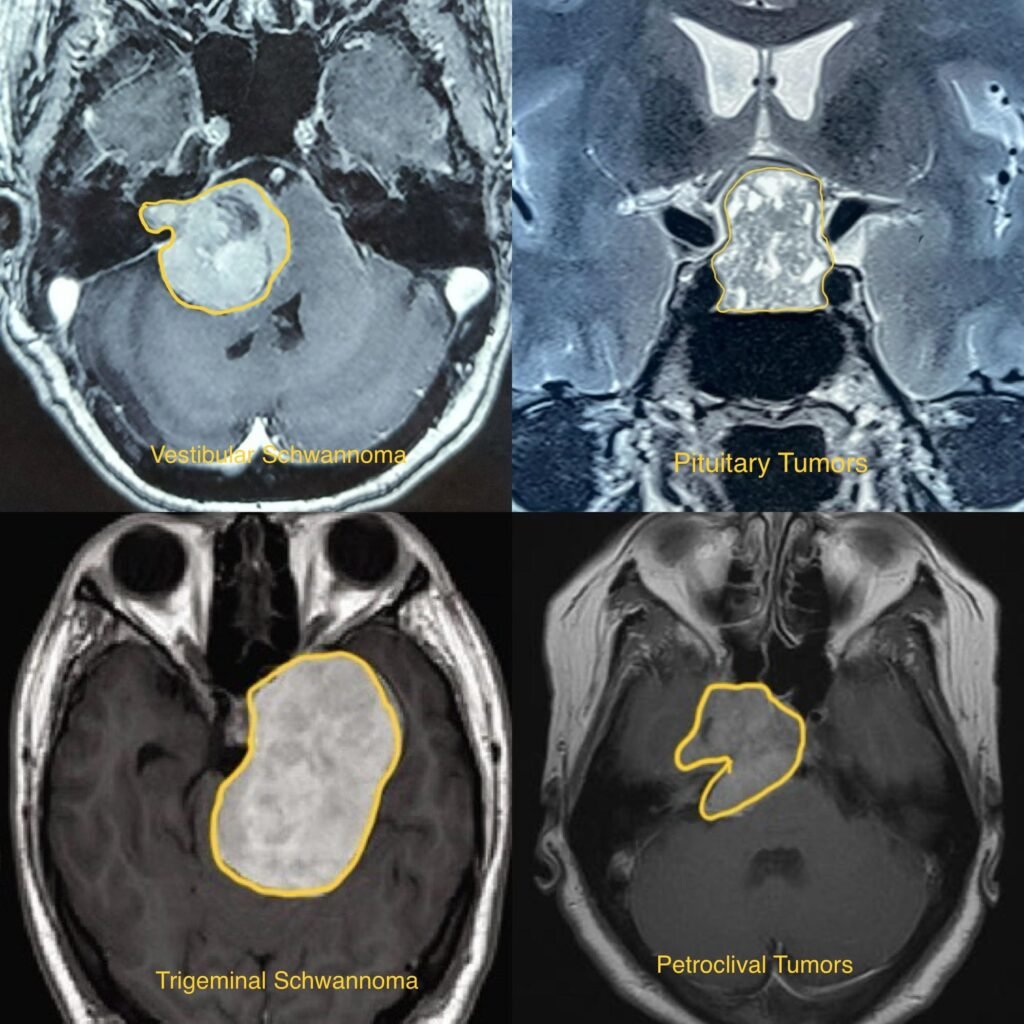Skullbase Tumors

What is it?
Skull Base Tumors are abnormal growths of cells that develop along the base of the skull, where the brain meets the facial structures. These tumors can originate from various types of tissues, including bone, cartilage, nerves, and blood vessels, and they can be benign (non-cancerous) or malignant (cancerous). Skull base tumors can be challenging to treat due to their location near critical structures of the head and neck.
Symptoms:
- Symptoms of skull base tumors can vary depending on the size, location, and type of tumor.
- Common symptoms may include headache, facial pain or numbness, vision changes, hearing loss or ringing in the ears (tinnitus), difficulty swallowing, hoarseness, and facial swelling or asymmetry.
Primary Symptoms:
The primary symptoms of skull base tumors may include:
- Headache: Persistent or severe headache, particularly at the base of the skull or behind the eyes, may occur due to increased pressure within the skull.
- Facial Pain or Numbness: Pain or numbness in the face, particularly on one side, may indicate compression or invasion of facial nerves by the tumor.
- Vision Changes: Blurred vision, double vision, or loss of peripheral vision may occur if the tumor affects the optic nerve or nearby structures.
- Hearing Loss or Tinnitus: Gradual hearing loss, ringing in the ears (tinnitus), or difficulty with balance may occur with tumors affecting the auditory nerves or inner ear.
- Difficulty Swallowing or Speaking: Dysphagia (difficulty swallowing) or dysphonia (hoarseness) may occur if the tumor compresses or impairs function of the throat or vocal cords.
Diagnosis/Treatment:
- Diagnosis typically involves a thorough physical examination, medical history, imaging studies such as MRI or CT scans, and sometimes biopsy to determine the type and grade of the tumor.
- Treatment options vary depending on the size, location, and type of tumor but may include surgery to remove the tumor, radiation therapy, chemotherapy, targeted therapy, immunotherapy, or a combination of these treatments.
What to Expect After Surgery:
- After surgery for a skull base tumor, patients can expect relief from symptoms caused by the tumor, such as headache, facial pain, or difficulty swallowing.
- Recovery time varies depending on the extent of the surgery and the individual patient’s condition, but most patients can expect to gradually improve over several weeks to months.
- Rehabilitation, including physical therapy, occupational therapy, speech therapy, and cognitive therapy, may be necessary to help regain function and independence.
Risk & Complications:
- As with any surgery, there are risks associated with procedures to treat skull base tumors, including bleeding, infection, nerve injury, cerebrospinal fluid leakage, and complications related to anesthesia.
- Additionally, there may be a risk of complications specific to the location and type of tumor being treated, such as damage to nearby cranial nerves, blood vessels, or brain structures.
- However, complications are relatively rare, and the benefits of surgery often outweigh the risks, particularly when the tumor is causing significant symptoms or affecting important functions such as vision, hearing, or swallowing. Early detection and treatment can improve outcomes and quality of life for patients with skull base tumors.
Brain Treatments
About Dr. Bharat
Dr Bharat Shinde completed his M.Ch Neurosurgery from the National Institute Of Mental Health And Neurosciences (NIMHANS), Bangalore which is an institute of National importance.
